

PopEntertainment.com >
Feature
Interviews - Actors
>
Feature Interviews K to O >
Liam Neeson (2004 interview)
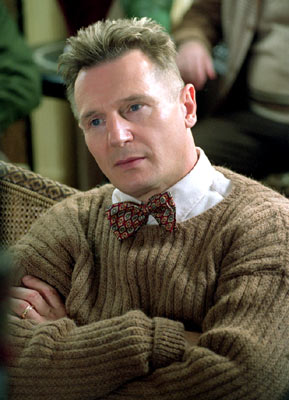
Liam Neeson
Investigates More Than His Soul in Kinsey
by Brad Balfour
Copyright © 2004
PopEntertainment.com.
All rights reserved. Posted:
November 17, 2004.
Oscar-winning actor Liam
Neeson doesn’t shy away from tough roles. When he took on Oskar Schindler
for Steven Spielberg, he faced a challenge but now that he's tackled Kinsey,
he has handled some difficult tasks for award-winning director Bill
Condon—aging 30 years, sounding distinctly American and performing several
homosexual loves scenes. But this Irish-born actor has met other challenges
before— from playing dark anti-heroes to landing a key role in Star Wars.
While he will star in another classic hero tale, Batman Begins, the
early praise for Kinsey suggests that he will be a contender for
another Oscar.
You’ve done, a few films where you’ve played real people.
What draws you
to historical films and the realm of nonfiction?
Well, I’ve made 44 films and four times I’ve played real characters. I’m
just drawn to people who have a pioneer spirit, this extraordinary energy
and commitment to their cause. That’s certainly true of Michael Collins,
Schindler, and to a certain extent, most definitely, Alfred Kinsey. Maybe
I’m drawn to them because I’m a lazy slob myself. I just love to see people
with energy that just burn up their day with their quest for what they’re
after.
What did you know of Kinsey before?
Very little. In my general reading in my ‘20s, I became aware of the Kinsey
Reports and the effect they had of American society.
What were the challenges for you to get into this character?
From an acting point of view, I bear no relation. I don’t look like Alfred
Kinsey at all, but thought somewhere in my artist, actor’s soul, I could
capture something of the spirit of the man. Then there’s obviously the
accent, the way of walking, and there’s the age range—Laura and I have to go
from 30 years of age up to 62. So we wanted to do that as subtly as
possible, and not draw attention to it. At the [Kinsey’s] Sex Institute in
Bloomington, Indiana, they were a phenomenal help, too. We went out there
for a few days, and they gave us access to materials. And the biographies,
there are four or five, ranging from very poor to excellent.
What did you learn about Kinsey working on this film and what did you
th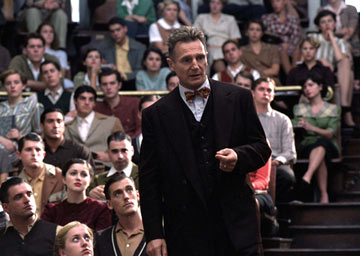 ink about sexuality that you hadn’t thought of before?
ink about sexuality that you hadn’t thought of before?
Just the variability of the sexual practices of the human species. Kinsey’s
quest was for us all to be tolerant and accepting of each other. So that
rich tapestry is really quite extraordinary which I had never really
contemplated before doing my research. Also the times he was living in and
the level of ignorance, especially with young people [really struck me].
Kinsey was devoted to young people. There were surveys done in the ‘40s
where 90% of high school boys didn’t know that they male was responsible for
having a baby with the woman. 95% never knew the word "masturbation". The
whole physiology of sex, a woman’s menstrual cycle, was totally unknown to
these boys in the ‘40s. It was common for girls in the ‘30s not to know
where babies came from. This is what Kinsey was confronted with, so he
provided a springboard to do something about it. He saw this awful gap in
human knowledge that he wanted to fill.
Do you think that Kinsey’s thoughts on homosexuality were skewered a bit
by his being bisexual?
I don’t think so. Bear in mind that he had planned to write a whole series
of books. The data he gathered from those eighteen
years of interviews, they used a tenth of that
data to write these two enormous volumes on male and female sexuality. In
those days homosexuality was a pathological disease, and a crime; one of
those things he did show was the prevalence of homosexuality, and indeed the
penal code was altered because of these reports. But, you know, there’s
still ten states that outlaw premarital sex, and
many more where adultery is still a crime.
What kind of kisser is Peter Sarsgaard?
He’s not bad. Needs to shave a bit more.
He didn’t think you were much good.
[Laughs]
Who taught you about sex?
Toilet walls.
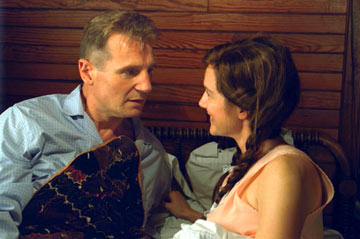 What was on them, any specific illustrations?
What was on them, any specific illustrations?
No, but they were crude, sort of strange Picasso-esque drawings of male and
female. That’s where I learned it from, and from my school chums.
Terrible feelings of guilt, too, looking at these crude drawings, you
know.
Did this film bring you back to those days of sexual repression in
Ireland?
Well it certainly made me think about how church and state are very much
hand in glove, as James Joyce once said. It had a total iron grip on the
morals of the country, and I grew up in the 50’s. Of course sex was never
talked about and discussed
You've got a couple of young kids.
At what age would
be all right for them to see this film?
I think they’d be so bored if they watched this, but they’ll see it at some
point, I think.
And have they had sex education?
We’ve done it. They’re eight and nine, and a few months ago they started
asking pertinent questions, so we had to tell them.
Do it have anything to do with you being in this film?
No, it came up the way it comes up naturally. I didn’t quiz them on stuff,
they were asking the right questions.
Any trepidation on your part?
Oh yeah, I thought I’d be pipe-smoking, wearing a cardigan, "Come here by
the fireplace," but I looked at my wife with pleading eyes, "You go first."
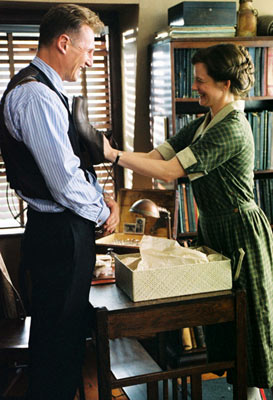
Who went first?
She did.
What would Michael Collins think of Alfred Kinsey?
I think he would have admired him, his energy and his work ethic,
definitely.
Are there other historic figures you’d like to play?
I’d like to play Ian Paisley, actually. I’d need building up, though he’s
very frail now
Can you talk about Batman?
I can’t talk about it.
Well, what made you say yes to doing it?
Well, That’s easy—[director] Christopher Nolan. And the script is quite
phenomenal, actually.
How was the shoot?
They only wrapped a few weeks ago after seven months, I was on for like
four.
What is your relationship with Bill Condon?
Very, very good. I’ve been an admirer of his since Gods and Monsters,
and he’s one of the few writer/directors I’ve worked with. Certainly Neil
Jordan, Woody Allen, Chris Nolan, exceptional people who are as gifted with
a pen as they are with a camera.
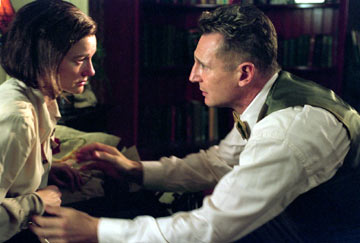 Lots of homework with [Condon]?
Lots of homework with [Condon]?
Lots of prep, and we were fortunate enough to have two weeks of rehearsal
before we started shooting, which was a luxury. You rarely get that.
What’s next?
I’ve got this Ridley Scott film coming out called Kingdom of Heaven
about the second Crusades. And I just
finished this Neil Jordan film called Breakfast on Pluto coming out
next year too. Batman’s coming out in
the summer as well.
So you’ll be busy.
Well, doing a lot more of this probably.
CLICK HERE TO SEE WHAT LIAM NEESON
HAD TO SAY TO US IN 2016!
Email
us Let us know what you
think.
Features
Return to the features page
